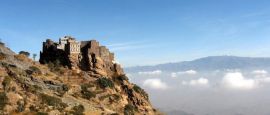Where to stay in Yemen
Accommodation in Yemen varies from simple village guesthouses and down-at-heel city hotels to converted tower houses, restored Sultans’ palaces and five star international luxury. Sana’a inevitably has the widest range of hotels, and to soak up the atmosphere there’s nowhere better than the Old City, though narrow streets make life difficult for drivers and thus it’s a less than convenient choice for those visiting on business. Outside the capital, Ta’iz, Seiyun, Wadi Do’an, Al Mukalla and Al Hudaydah all have a range of accommodation. Those self-selecting individuals heading for Socotra will return educated in just how simple a simple guesthouse can be.
Leisure travellers to Sana’a should consider the lovely Burj Al Salam (www.burjalsalam.com) in the Al Fulayhi Quarter of old Sana’a. Another converted tower house, rooms are small but comfortable with clean functional bathrooms. The upstairs restaurant is very good and the staff helpful when it comes to planning a meal. The same owners have recently opened a new hotel in Thula one of the scenic mountain villages outside Sana’a. Elsewhere, Yemeni tour operators such as Universal Touring Company (www.utcyemen.com) or Bazara Travel (www.bazaratravel.com) either own or have links with smaller hotels en route and can make informed suggestions regarding accommodation.
Contact the Yemen Tourism Promotion Board for further details of hotels in Yemen (see Important Addresses).
Those hiking longer trails in the Haraz Mountains of Western Yemen or exploring the unspoilt wilderness of Socotra may find camping to be the only accommodation available. Though a few designated camping areas do exist it’s best to take local advice on where it’s permissible and safe to pitch a tent. A leafy glade amongst a quiet qat plantation is not recommended - most of these are overseen by twitchy guardians armed with AK47s.
Budget: Leisure travellers on a on a budget should definitely explore the Dawood Hotel (www.dawoodhotel.com) in the Talah Quarter of old Sana’a and failing that the neighbouring Taj Talah Hotel. The Dahwood has a good al fresco restaurant overlooking one of Sana’a’s cultivated allotments. Both tower house hotels offer wonderful views of Sana’a’s unique cityscape from their rooftop mafrajs’ (sitting rooms).
Luxury: In Sana’a Movenpick (www.moevenpick-hotels.com) and Sheraton (www.starwoodhotels.com) are the established brand hotels for business travellers, the former being superior in quality and range of facilities. However, due to Yemen’s challenging environment both of these hotels exist behind interminable barriers of security. The five star Sheba Hotel (www.shebahotel.com) offers a convenient alternative, close to the old city and commercial district, with everything an everyday business traveller needs without the diplomatic ring of steel. In Al Huydaydah Holiday Inn (www.holidayinn.com) have a comfortable property, though with taxis thin on the ground it’s inconveniently far from the centre of town. In Ta’iz the former Sofitel, now Al Saeed Hotel (www.accorhotels.com), is palatial and has commanding views over the city. In Aden the former Movenpick (www.moevenpick-hotels.com), along with the Sheraton (www.starwoodhotels.com) and Mercure (www.mercure.com) are the city’s exclusive addresses.
Unique: Wadi Do’an’s Khailah Palace Hotel, in the area known as Khailat Bugshan, is a multicoloured masterpiece of desert architecture. Amongst the remarkable landscapes of Hadhramawt’s Wadi Do’an it’d be difficult for any manmade structure to stand out against the striking vistas of flat-topped mesas and plunging wadis. However, in his restoration and preservation of the ornate Khailah Palace, Sheik Abdullah Ahmed Bugshan has succeeded. There are rumours that the hotel will soon be closed in deference to another establishment the Sheik has just constructed overlooking Wadi Do’an, so check its status locally or with a tour operator.
Do you have any Feedback about this page?
© 2026 Columbus Travel Media Ltd. All rights reserved. No part of this site may be reproduced without our written permission, click here for information on Columbus Content Solutions.




 You know where
You know where